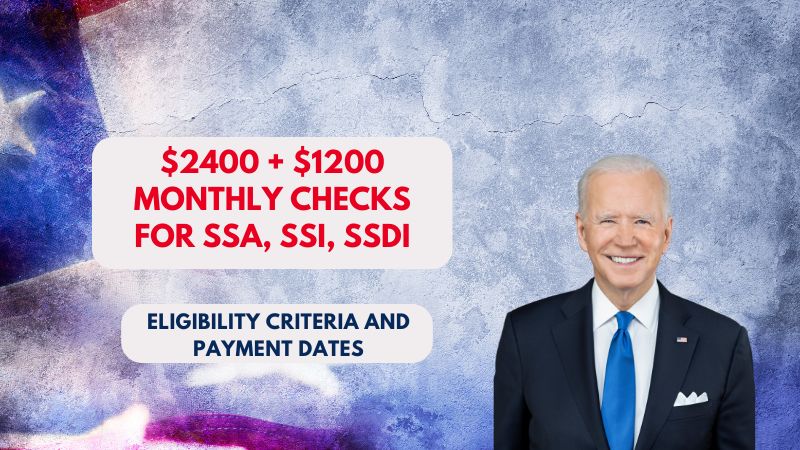In the United States, many citizens with low income often struggle to cover their basic living expenses. To address this issue, the government provides financial assistance in the form of monthly payments, primarily through Social Security programs. These payments are crucial for many, but they often fall short in covering the rising costs of living. Recognizing this gap, the government has proposed additional support for low-income individuals through two new payment programs: the $2400 annual increase under the Social Security Expansion Act and the $1200 monthly Guaranteed Income payments.
In this guide, we will explore the specifics of these proposed $2400 + $1200 monthly checks for SSA, SSI, and SSDI recipients, including eligibility criteria, payment schedules, and frequently asked questions.
What Are the $2400 + $1200 Monthly Checks?
These two payments—$2400 and $1200—are aimed at providing financial relief to low-income citizens, and the good news is that eligible individuals can receive both checks simultaneously. Here’s a breakdown of each:
- $2400 Monthly Check: This payment is part of the Social Security Expansion Act, a proposal that seeks to increase Social Security benefits by $200 per month. If approved, this would provide an additional $2400 annually to qualified individuals.
- $1200 Monthly Guaranteed Income Check: This payment is designed to provide Guaranteed Income for low-income earners across the U.S. If implemented, eligible individuals would receive $1200 per month as part of a nationwide program.
Both of these payments are currently proposals, but they have the potential to offer significant financial assistance to millions of Americans. Let’s dive deeper into what these payments mean, who qualifies, and when they might be issued.
Eligibility
The Social Security Expansion Act proposes a $200 monthly increase in Social Security payments for all current and future claimants. This includes recipients of:
- Retirement, Survivors, and Disability Insurance (RSDI)
- Supplemental Security Income (SSI)
- Veterans Affairs (VA) benefits
The purpose of this increase is to address the inadequacy of current Social Security benefits in meeting the basic needs of low-income individuals. If approved, this $2400 annual increase would apply to all qualified citizens who are already receiving Social Security benefits.
Key points about eligibility:
- You must already be a recipient of Social Security benefits, including SSI, SSDI, or VA benefits.
- New claimants of Social Security benefits would also be eligible for the increase.
Eligibility for the $1200 Monthly Guaranteed Income
In addition to the $2400 increase, a $1200 monthly check will be available as part of a Guaranteed Income program. This payment is designed to support U.S. residents with low incomes. Here’s what you need to know:
- Single individuals with an annual income of $75,000 or less qualify.
- Married couples with a combined income of $150,000 or less are eligible.
- The program is aimed at providing consistent, reliable income to those who fall below these thresholds, ensuring financial stability for low-income households.
Unlike the Social Security Expansion Act, the $1200 Guaranteed Income payment is not tied specifically to Social Security benefits but is intended for all U.S. residents who meet the income criteria.
Payment Schedule
At this point, both the $2400 Social Security Expansion Act and the $1200 Guaranteed Income payments are proposals. They will require approval from the Senate, the White House, and the President before they become law.
Once approved, payments will be distributed according to the Social Security Administration (SSA) schedule. Recipients can choose between receiving paper checks or having their payments deposited directly into their bank accounts.
To stay informed on the status of these proposals and the payment schedule, it’s essential to monitor updates from the SSA, which will post any new developments on its official website.
Also read: $1,500 Child Checks September 2024
Conclusion
The proposed $2400 + $1200 monthly checks for SSA, SSI, SSDI have the potential to offer substantial financial relief to millions of low-income individuals across the U.S. With the Social Security Expansion Act, beneficiaries can expect a $200 increase in their monthly payments, amounting to $2400 annually. In addition, the $1200 monthly Guaranteed Income payment could provide further support to those in need.
While these payments are not yet finalized, the fact that they are under serious consideration is encouraging. Keep an eye on updates from the SSA and other government authorities for the latest developments. If approved, these payments could significantly improve the financial well-being of low-income households.
By addressing the growing gap between income and living expenses, these programs aim to provide long-term security and financial stability for those who need it most.
FAQs
Who is eligible for the $2400 monthly check?
The $2400 annual increase is part of the Social Security Expansion Act and will be available to anyone currently receiving Social Security benefits, including those on SSI, SSDI, and VA benefits.
Can I qualify for both the $2400 and $1200 monthly checks?
Yes, if you meet the eligibility criteria for both programs, you can receive both payments simultaneously. The $2400 increase applies to Social Security recipients, while the $1200 monthly Guaranteed Income is for low-income individuals nationwide.
When will these payments be issued?
Currently, both payments are proposals. Once approved by the government, they will be issued according to the Social Security Administration’s schedule. Be sure to follow updates from SSA for the latest information.
How will I receive my payments?
You will have the option to receive your payments either as a paper check or via direct deposit into your bank account, as per the standard Social Security payment methods.
Are these payments guaranteed to happen?
While both the $2400 and $1200 payments are still proposals, they have significant support and are likely to be approved. However, until they are officially enacted, nothing is guaranteed. Stay tuned to official updates from the SSA.

